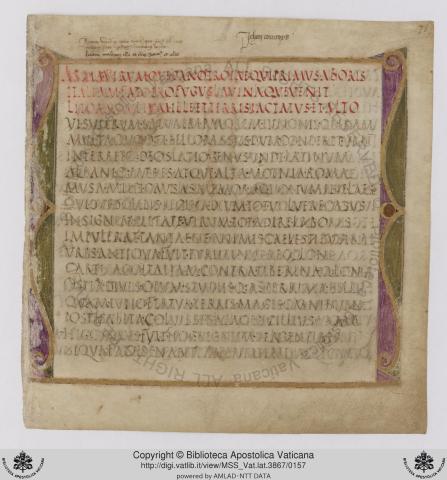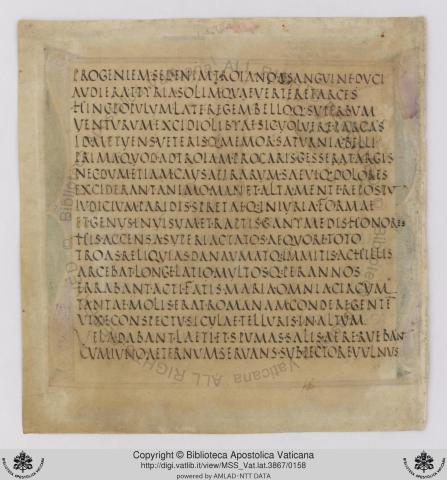Urbs antīqua fuit (Tyriī tenuēre colōnī)
Karthāgō, Ītaliam contrā Tiberīnaque longē
ōstia, dīves opum studiīsque asperrima bellī,
quam Iūnō fertur terrīs magis omnibus ūnam15
posthabitā coluisse Samō. hīc illius arma,
hīc currus fuit; hoc rēgnum dea gentibus esse,
sī quā Fāta sinant, iam tum tenditque fovetque.
Prōgeniem sed enim Trōiānō ā sanguine dūcī
audierat Tyriās ōlim quae verteret arcēs;20
hinc populum lātē rēgem bellōque superbum
ventūrum excidiō Libyae; sīc volvere Parcās.
Id metuēns veterisque memor Sāturnia bellī,
prīma quod ad Trōiam prō cārīs gesserat Argīs—
necdum etiam causae īrārum saevīque dolōrēs25
exciderant animō; manet altā mente repostum
iūdicium Paridis sprētaeque iniūria fōrmae
et genus invīsum et raptī Ganymēdis honōrēs:
hīs accēnsa super iactātōs aequore tōtō
Trōas, rēliquiās Danaüm atque immītis Achillī,30
arcēbat longē Latiō, multōsque per annōs
errābant āctī Fātīs maria omnia circum.
Tantae mōlis erat Rōmānam condere gentem.
notes
Manuscripts: M 12-29, 30-33 | R 12-18, 19-33
The history of Juno’s enmity to the Trojans: her dear city, Carthage, was threatened by a decree of the Fates to be destroyed by a Trojan race; further, she had hated Troy’s people ever since the insult set upon her by the judgement of Paris (Austin).
12: urbs antiqua: Carthage was “ancient” with reference to the time of Vergil, not to the time of Aeneas (Frieze). Tyrii: Carthage was founded by Phoenicians from Tyre (F-B). tenuere: the ending ēre for erunt is very common in poetry, being convenient for metrical purposes (C-R) (AG 163). As object understand eam, referring to urbem (Bennett).
13: Italiam contra: an instance of anastrophe, inversion of the usual word order (F-B). contra...longe: These words go together, and in prose the order would be longe contra Italiam Tiberinaque ostia “far away and directly facing Italy and the mouth of the Tiber.” The peculiarity here is that the two words longe contra both go with two accusatives, but are distributed or interwoven with the co-ordinated accusatives as though one went with Italiam and the other with the other half of the phrase (Conway). longe: modifying contra, “facing Italy far away,” Carthage and Rome being on opposite shores of the great Mediterranean Sea (F-B). Of course when Vergil speaks of Carthage as “opposed to Italy” he is thinking of its historical as well as its geographical position (Page).
14: dives opum: opum is genitive of specification (Wetherell). Gen. of respect, especially common with words of plenty, abounding (plenus, dives, abundans) (Sidgwick) (AG 349a,d). A poetical construction (F-B). Vergil is very fond of using the genitive after adjectives—substituting it in many cases for the more ordinary ablative (Carter). studiis: “in its passion for”: abl. of specification (G-K) (AG 418). dives...belli: “rich in resources, and formidable in the pursuits of war” (Frieze).
15: quam ... coluisse: “which Juno is said to have cherished” (G-K) (AG 582). fertur: = dicitur (Knapp). unam: often used to strengthen a superlative idea (F-B). It intensifies quam (Walpole). The phrase magis omnibus unam would be in prose unam omnium maxime (Carter).
16: posthabitā Samō: ablative absolute. On the island of Samos was a famous temple of Juno. In connecting Juno with Carthage, Vergil identifies her with the Phoenician Astarte (Ashtaroth). Note the hiatus in Samo hic, which is allowed because of the caesura and the break in the sense (F-B). coluisse: “cherished” (Conway). hīc: the adverb (Bennett). illius: in the genitive termination -ius the poets often use the i as short (Bennett). hic illius arma: this and the two following clauses form a tricolon in crescendo pattern, with anaphora (Austin 1971).
17–18: hoc ... fovetque: regnum is a substitute for regno, the dative of “the end,” and gentibus a dative of “the object,” governed by esse (Frieze) (AG 382). hoc ... esse: an acc. and infinitive following the sense of “wish” or “desire” contained strongly in tendit and less strongly in fovet (Page). regnum ... fovetque: The combination of tendit (intransitive) and fovet (transitive) is a strong expression of desire, and so governs an accusative with the infinitive (F-B). esse: object infinitive of tendit and fovet (Bennett). Completing the meaning of tendit and fovet, a poetical extension of the accus. and inf. with verbs of wishing (C-R).
17: fuit: the verb is in the singular in agreement with currus, though arma is also its subject (Carter). hoc: agrees with the following noun, regnum, though it refers to urbs (Frieze). By attraction for hanc (urbem) (F-B) (AG 296.2a). gentibus: a poetic use of the dative where we should expect the objective genitive (Bennett).
18: si qua fata sinant: subjunctive of subordinate clause in indirect discourse (Bennett) (AG 589). Future protasis, of which the apodosis is absorbed in tendit esse, etc. (G-K). si qua: “if in any way”; qua is the indefinite adverb (Bennett). sc. ratione or via (Carter). = si forte (Storr). iam tum: “even then”; so early in the history of Carthage: before it was even completely built, and before it had subdued even the neighboring tribes of Africa (Frieze).
19: sed enim: “but indeed,” “however” (Frieze). duci: (imperf.) “was springing” (P-H), literally “was being led,” infinitive > dūco, -ere.
20: olim: “one day” (Bennett). Of time indefinite, either past, present, or future (Storr). quae verteret: “which would overthrow.” The subjunctive is due to indirect narration and represents a future indicative (F-B) (AG 580). = everteret (Walpole). audierat: = audīverat (Walpole) (AG 181b).
21: hinc: i.e., Troiano a sanguine (C-R). late: modifies the verbal idea which is prominent in regem (= regnantem) (F-B). regem: = regnantem qualifies the personified populum (Walpole). = regnantem by antimeria (the using of one part of speech for another). superbum: really indicating the “pride” which comes from success, here denotes that success (Walpole).
22: venturum: sc. esse (Walpole). excidio Libyae: datives; one to what, the other for what (G-K) (AG 382). The Roman general Scipio Aemilianus besieged Carthage for three years until it fell, in 146 BC. After sacking the city, the Romans burned it to the ground. A modern myth has grown up that the Roman forces then sowed the ruins with salt, but this story has no basis in fact. (Ancient History Encyclopedia). sic volvere Parcas: “so the Fates decree”; literally, “spin” or “unwind,” i.e., the thread of destiny (F-B). The Parcae were Clotho, Lachesis, and Atropos, conceived as spinning the fate of men; volvere is here used in the sense of evolvere, another instance of the use of the simple verb for the compound (Bennett) (Smith’s Dictionary s.v. Moirae).
23: id: sums up 19–22 (Knapp). metuens, memor: the principal verb [arcebat] follows in line 31, but the long parenthesis of lines 25–28 has disturbed the natural run of the sentence (C-R). Saturnia: i.e., Juno, the daughter of Saturn (Bennett). veteris: the old, i.e., “the former” (Chase). belli: i.e., the Trojan War (F-B).
24: prima: “first,” used freely for prior, “formerly,” or “of old,” and having an adverbial force (F-B). “Foremost.” She was the leader and chief instigator of the gods and heroes who fought on the Greek side at Troy (Frieze). ad Troiam: “around Troy” (Bennett) (AG 428d). “At Troy,” in the vicinity of Troy (Walpole). Argis: ablative plural of Argi (-orum), another form of Argos, the capital of Argolis. By saying “in behalf of dear Argos,” Vergil means, “in behalf of Greece” (synecdoche) (Bennett). dolores: “pangs,” i.e., caused by the “affront,” explained in the following verses (Comstock).
25–8: The passage from 25 to 28, inclusive, is parenthetical (Frieze).
26: animo: ablative of separation after exciderant, with the preposition omitted (Carter) (AG 402). manet: singular with iudicium, though iniuria, genus and honores are all its subjects (Carter). alta mente repostum: “deeply stored in her mind,” literally, “in her deep mind”; repostum for repositum by syncope (F-B).
27: iudicium Paridis: the “Judgement of Paris” refers to the well-known Greek tale that Strife threw a golden apple in among the feasting gods as a prize for the fairest: that Hera (Iuno), Aphrodite (Venus), and Pallas (Minerva) all claimed it; and that the Trojan prince Paris was made judge and assigned the prize to Venus. So Iuno resented the judgment and her “slighted beauty’s wrong” (Sidgwick; see Smith’s Dictionary s.v. Paris.) spretaeque iniuria formae: iniuria means the same as iudicium,—a case of epexegesis (Wetherell). -que: introducing not a new idea, but a modification or explanation of a former one (P-H). formae: objective genitive (Frieze). Gen. of definition (Walpole) (AG 343d).
28: genus invisum: Juno hated the whole Trojan race because its founder Dardanus was a son of Jupiter by Electra (Walpole) (Smith’s Dictionary, s.v. Dardanus). rapti Ganymedis honores: “the honors of the stolen Ganymede,” the beautiful Trojan youth, whom an eagle carried off to Olympus to be Jupiter’s cupbearer (F-B) (Smith’s Dictionary s.v. Ganymedes). rapti: with Ganymedis, not with honores (Carter).
29: The construction of the sentence interrupted by the preceding parenthetical lines, is here resumed (Frieze). his: sc. rebus. Abl. of cause (Walpole). super: adverb = insuper (P-H). aequore toto: the ablative of place with totus is the regular construction in prose (Storr).
30: Troas: a Greek accusative form (F-B) (AG 81.5). Danaum: = Danaorum (Wetherell) (AG 49d). Achilli: a contracted gen. of decl. II (Wetherell). Danaum ... Achilli: subjective genitives with reliquias, “left by the Greeks and by Achilles” (Carter).
31: arcebat: imperfect of constant action (Austin 1971). Latio: ablative of separation, without preposition (F-B) (AG 401).
32: maria ... circum: anastrophe (Wetherell); the preposition circum follows its objects.
33: molis: predicate genitive of quality (F-B) (AG 345). condere: subject of erat (Carter).
vocabulary
Tyrius, a, um: adj. (Tyrus), of Tyre; Tyrian or Phoenician, 1.12; subst., Tyrius, iī, m., a Tyrian, 1.574; pl., 1.747.
colōnus, ī, m.: a cultivator or tiller; a husbandman, freq.; settler, colonist, 1.12. (colō)
Karthāgō, inis, f.: a city built by Phoenician adventurers on the northern coast of Africa, opposite Sicily, a short distance N.E. of the modern Tunis, 1.13, et al. (Καρχηδών, new city)
Ītalia, ae (Ī by poetic (epic) license), f.: Italy, 1.2, et al.
Tiberīnus (Thӯbrinus, 12.35), a, um: adj. (Tiberis), pertaining to the Tiber; Tiberine, 1.13, et al.; subst., Tiberīnus, m., the river-god, Tiber; the Tiber, 6.873.
ōstium, iī, n.: a mouth; entrance, gate, door, 6.81; pl., ōstia, ōrum, harbor, port, 5.281; mouth of a river, 1.14. (1. ōs)
asper, era, erum: (adj.), rough, 2.379; rugged, craggy, jagged, 6.360; chased, embossed, 5.267; (fig.), of the weather, stormy, 2.110; of temperament, spirit, or nature, barbarous, 5.730; formidable, fierce, 1.14; full of strife, warlike, 1.291; cruel, stern, 6.882; angry, 1.279; bitter, 2.96; displeased, 8.365.
Iūnō, ōnis, f.: Juno, the Sabine and Roman name for the wife and sister of Jupiter, daughter of Saturn, 1.4, et al.; Iūnō īnferna, the Juno of the lower world, Proserpine, 6.138.
magis, and short form, mage: (adv.), in a greater measure; more, 5.94; 10.481; the more, 7.787; for potius, by preference, rather, 5.29; better, 4.452. (rel. to māgnus)
posthabeō, uī, itus, 2, a.: to hold next; esteem less, 1.16.
Sāmos (-us), ī, f.: Samos, an island southwest of Ephesus, near the coast of Ionia, 1.16.
quis, qua or quae, quid or quod: (indef. pron., adj., and subst.), any, some, 2.94, et al.; some one, any one, any body, anything, something, 1.413, et al.; sī quis, nē quis, etc., if any, lest any, etc., freq.; (adv.), quid, as to anything, in anything, at all, freq.; sī quid, if at all, freq.
foveō, fōvī, fōtus, 2, a.: to keep warm; (fig.), foster, protect, cherish, 1.281; soothe, 12.420; caress, make love to, 1.718; rest, incline, 10.838; to toy away, enjoy, 4.193; cherish, hope, long, desire, 1.18.
prōgeniēs, ēī, f.: lineage, progeny, race, 1.19; offspring, 5.565; son, 7.97. (prōgignō)
Trōiānus, a, um: adj. (Trōia), Trojan, 1.19; subst., Trōiānus, ī, m., a Trojan, 1.286; pl., Trōiānī, ōrum, m., the Trojans, 5.688.
Tyrius, a, um: adj. (Tyrus), of Tyre; Tyrian or Phoenician, 1.12; subst., Tyrius, iī, m., a Tyrian, 1.574; pl., 1.747.
lātē: (adv.), widely; far and wide, 1.21; on all sides, far around, 1.163; all over, 12.308. (lātus)
excidium, iī, n.: a complete cutting or tearing down; razing, demolition, destruction. (exscindō)
Libya, ae, f.: Libya; northern Africa; by poetic license, Africa, 1.22, et al.
volvō, volvī, volūtus, 3, a.: to roll, 1.86; roll along or down, 1.101; roll or cast up, 3.206; toss, hurl, 12.906; roll over, roll in the dust, 12.329; cast, hurl down, 1.116; 9.512; roll, wheel, 1.163; of books, open, unroll, 1.262; of the Fates, fix the circle of events, decree, ordain, dispose, 1.22; 3.376; of the mind, revolve, meditate, reflect upon, 1.305; pass, continue, live through, experience, endure, suffer, 1.9; rotam volvere, to complete a cycle, period; (pass.), volvī, roll over, roll, 10.590; turn or wind about, 7.350; to be shed, to flow, 4.449; roll on, revolve, 1.269.
Parca, ae, f.: more freq. pl., Parcae, ārum, f., the Fates (Clotho, the spinner, Lachesis, the allotter, and Atropos, the unaverted), 1.22, et al.
memor, oris: adj. (rel. to mēns and meminī), mindful, remembering, 1.23; heedful, 480; thankful, grateful, 4.539; not forgetting; relentless, 1.4; with nōn or nec, unmindful, regardless, 12.534.
Sāturnius, a, um: adj. (Sāturnus), belonging to Saturn; Saturnian; sprung from Saturn; Saturnian, 4.372; subst., Sāturnius, iī, m., the son of Saturn, 5.799; Sāturnia, ae, f., 1. Daughter of Saturn, Juno, 1.23; 2. The city of Saturnia, built by Saturn on the Capitoline hill, 8.358.
Trōia, ae, f.: 1. Troy, the capital of the Troad, 2.625, et al. 2. A city built by Helenus in Epirus, 3.349. 3. A part of the city of Acesta in Sicily, 5.756. 4. The name of an equestrian game of Roman boys, 5.602.
Argī, ōrum, m., and Argos, n.: Argos, the capital of Argolis, and a favorite abode of Juno, 1.24; Greece, 2.95. (nom. and acc.)
necdum: (adv.), nor yet; and not yet, 1.25.
excidō, cidī, 3, n.: to fall out; fall from; drop, come from, 2.658; come down, descend, 9.113; depart, 1.26. (ex and cadō)
repōnō, posuī, positus (postus), 3, a.: to lay, place, put back, replace, 3.231; lay aside or down, 5.484; put, lay up, store away, w. abl., 4.403; lay, deposit, place, 6.220; w. dat., 11.594; restore, w. in and acc., 1.253; return, repay, 12.878.
Paris, idis, m.: Paris, son of Priam and Hecuba, who occasioned the Trojan war by carrying off Helen from Sparta; slain by the arrow of Philoctetes, 4.215, et al.
spernō, sprēvī, sprētus, 3, a.: to sever, remove; (fig.), reject, despise, scorn, disdain, 4.678; insult, 1.27.
invīsus, a, um: hated, hateful, odious, 1.387; (act.), inimical, an enemy, hostile, 11.364.
Ganymēdēs, is, m.: Ganymede, son of Tros, and cup-bearer of Jupiter, 1.28.
accendō, ī, cēnsus, 3, a.: to set fire to, light up, enkindle, 5.4; enrage, exasperate, incense, 1.29; incite, rouse, 4.232. (ad and candō, rel. to candeō)
iactō, āvī, ātus, 1, freq. a.: to throw often or much; toss to and fro; toss, freq.; hurl, cast, 2.459; thrust out, 5.376; aim, 5.433; (fig.), throw out words, utter, say, 1.102; of the mind, revolve, meditate, 1.227; sē iactāre, boast, exalt one's self, rejoice, glory, 1.140; prae sē iactāre, to make pretense of, 9.134; p., iactāns, antis, arrogant, assuming, ambitious, 6.815. (iaciō)
Trōes, m.: (subst.), the Trojans, 1.30, et al. (Tros, one of the kings of Troy)
rēliquiae, ārum, f.: the things left; remnant, 1.30; relics, remains, 4.343. (relinquō)
Danaī, ōrum, m.: the Greeks, 2.327.
immītis, e: (adj.), not mellow; not mild; merciless, fierce, cruel, ruthless, 1.30.
Achillēs, is (eos or ī), m.: the son of Peleus, king of Thessaly, and Thetis, daughter of Nereus, 1.468, et al.
arceō, uī, 2, a.: to inclose, shut in; restrain, bind, 2.406; debar, keep off, repel, 1.435; protect, save from, 8.73.
Latium, iī, n.: a country of ancient Italy, extending from the left bank of the lower Tiber to Campania, 1.6; (meton.), for Latīnī, the Latins, people of Latium, 10.365, et al. (2. latus; Virgil, 8.323, derives it from lateō)
circum: (adv.), about, around; (prep. with acc.), around, about.
mōlēs, is, f.: a cumbrous mass; a heavy pile or fabric; mound, rampart, 9.35; dike, 2.497; a mass of buildings, vast buildings, 1.421; structure, 11.130; frame or figure, 2.32; bulk, 5.118; weight, 7.589; pile, mass, 1.61; gigantic frame, 5.431; warlike engine, siege tower, 5.439; array, pomp, train, 12.161; body of soldiers, phalanx, 12.575; heavy storm, tempest, 5.790; toil, work, labor, 1.33.
Rōmānus, a, um: adj. (Rōma), belonging to Rome; Roman, 1.33; subst., Rōmānus, ī, m., a Roman, 1.234.




